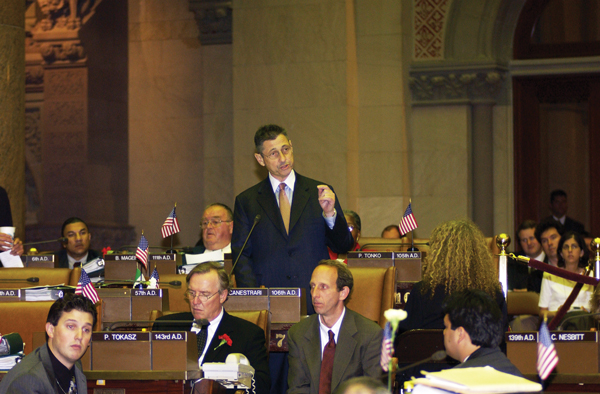
BY ALINE REYNOLDS | New York State Assembly Speaker Sheldon Silver, a lifelong resident of Lower Manhattan — the district he represents in the state Legislature — has received the National Excellence in State Leadership Award, a prestigious recognition given to only a handful of people previously. Having assumed leadership of the Assembly in 1994, Silver claims the title of the longest-serving Democratic Speaker in the history of the state. In an interview with the Downtown Express, he spoke about his tenure in the Assembly and his long-term residency in Lower Manhattan.
Congratulations, Speaker! How do you feel about earning this prestigious award?
Thanks. I’m truly humbled. They give out this award once every two years across the nation. I think it’s a validation of the way I led the Assembly. It’s always easy, especially in New York, to get lost in the media hype and in polls, so it’s exciting to be cited for excellence by a committee of my national peers.
Who selected you for this award?
An independent panel of the National Conference of State Legislatures and the State Legislative Leaders Foundation.
You grew up in Lower Manhattan, which you now represent politically. Do you still live in the neighborhood?
Yes — five blocks from where I was raised. I was born on Henry Street, moved to Grand Street, I got married and moved to East Broadway, and my family got larger and I moved back to Grand Street. It’s the best place to live and raise a family. My grandparents came to this country and moved to Essex Street — their first place was there. My parents moved to Henry Street; my four grandsons lived there up until about a year ago. We’ve always found it a very good place to live — we have great neighbors, and it’s just a great community overall. It’s very convenient, as well, since my district office is at 250 Broadway.
What did you do prior to joining the New York State Assembly?
After graduating from Brooklyn Law School, I worked as an attorney for a year-and-a-half in a Downtown Broadway office. I was a law secretary to a judge for about five years, and then I ran for the Assembly at age 32.
How did you start out in the Assembly? I first served as chair of the Election Law Committee. At the time, I introduced the first public finance bill, which passed in the Assembly about a dozen times since 1986 but never passed the Senate. It was the first public campaign finance bill in New York, before the NYC Campaign Finance Board was formed. Then I became chair of the Codes Committee, which deals with the criminal justice system and the civil justice system. They’re the laws that are implemented in the courts. Then, I became chair of the Ways and Means Committee — the budget committee — until 1994. When Assembly Speaker Saul Weprin died in office, I was elected to replace him.
Which Downtown-related state law enacted since your tenure as Speaker is the most important to you, personally?
Probably the most important thing I did, generally, was institute a universal pre-kindergarten program across the state. We passed several laws after 9/11, which I called my “Marshall Plan” for Downtown. We provided tax incentives and actual money for people to renew leases Downtown — both business and residential — in proximity to the World Trade Center area, and authorized actual cash grants at the time.
Speaking of the World Trade Center, does the state play a role in resolving the stalemate?
No. It’s more in the hands of the Governors of New York and New Jersey.
How has Lower Manhattan changed in the years that you’ve served as state Assembly Speaker?
I was able to build new schools Downtown in order to catch up to the population that was exploding here. State money pays about half of all the education expenses of the city; I’ve increased that state money to the city by several billion dollars since I became Speaker. Groups like Manhattan Youth, the Chinese-American Planning Council and Asian-Americans for Equality got state money from a budget that provided for new youth in our district. There are also a number of senior citizen luncheon programs and social programs — like the Naturally Occurring Retirement Community program, which provides services to seniors to keep them in their homes rather than institutionalize them.


































